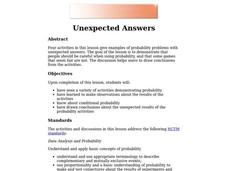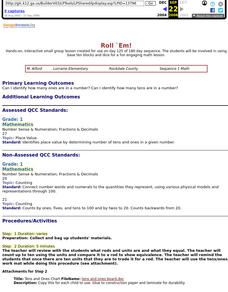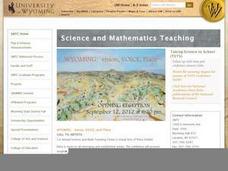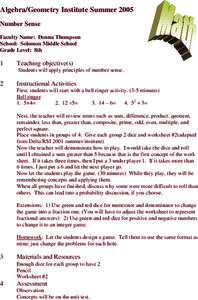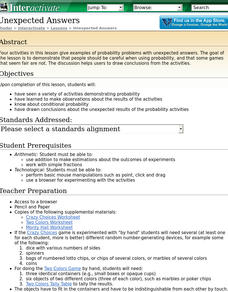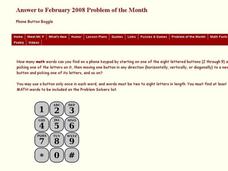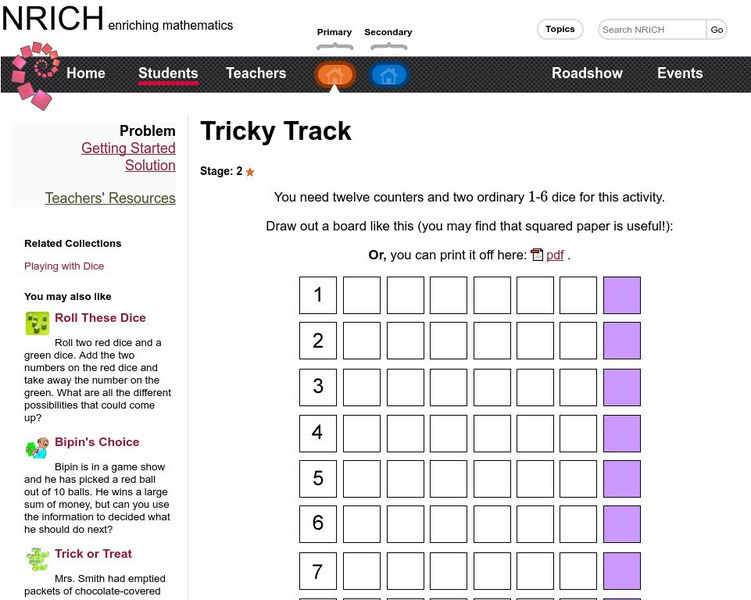Curated OER
Let's Take a Chance!
Students investigate probability and the chance of an even happening. In this algebra lesson, students incorporate their knowledge of probability to solve problems and relate it to the real world. They learn to make decisions based on data.
Curated OER
Acting Like a Hog
Students explore game theory. In this secondary mathematics lesson, students plat the game of HOG using dice and explore the optimal strategies. Students play the game three ways: any number of dice, a fixed number of dice and using...
Curated OER
Fast Facts
Ever use the inner circle/outer circle method of learning? Placing learners in a stationary inner circle and a rotating outer circle, they roll a die and attempt to be the first to call out an addition or multiplication equation with the...
Curated OER
The Fair Factor
Students participate in playing many games to determine if they are fair or not. They create their own game that is fair to play with their classmates.
Curated OER
Modeling Forest Fires Using Probability
Learners explore forestry. They discuss creating fire breaks to control forest fires. Students create models to determine the best way to manage forest fires. They discuss current techniques of forest management.
Curated OER
Lara's Equiprobable Dice
Students try some new exercises involving probability. These are, first of all, that the probability of getting a given total when two dice are rolled is equal to the number of possible ways of getting that total, divided by 36 (the...
Curated OER
Richard's Dice
Young scholars problem solve logic problems. They complete a worksheet using dice as a manipulative. They decide on a problem solving strategy, solve the problem, and write up the solution.
Curated OER
Make the Highest Total
Sixth graders predict the outcome of a simple probability experiment, test it and explain the result by using problem solving strategies to explore situations mathematically. They then play a few games informally where students play in...
Curated OER
Matching Pairs
Students examine the probability of the various findings in a game and determine the odds of winning. They differentiate between the facts of odds versus probability. Students use higher order thinking skills to explain how a problem is...
Curated OER
Unexpected Answers
Students explore and complete a variety of activities demonstration probability. They make observations about the results of the activities. Students complete and discuss conditional probability. Also, students draw conclusions about...
Curated OER
Rolling For Value
Young scholars participate in a lesson to comprehend the concept of probability while rolling dice. They recognize patterns while making observations and recording the data for each roll. Students also review place values while playing a...
Curated OER
"The Giver" by Lois Lowry
Students predict results, design a model, and carry out trials to determine probability based on their experimentation.
PBS
Remove One
With a set of 15 chips and a number line, learners predict what sums may occur with the rolling of two dice. When their sum comes up, they remove one of the chips from their number line with the objective of being the first to remove...
Curated OER
Lotto or Life: What Are the Chances?
Though the website does not seem to have the mentioned video, a reding and lottery style games simulate the chances of finding intelligent life somewhere other than Earth. Without the video, this lesson is short, but it can be a useful...
EngageNY
Expected Value of a Discrete Random Variable
Discover how to calculate the expected value of a random variable. In the seventh installment of a 21-part module, young mathematicians develop the formula for expected value. They connect this concept the dot product of vectors.
Curated OER
Roll `Em!
First graders engage in using base ten blocks and dice for a fun engaging math lesson. They use a worksheet imbedded in this lesson as the game board to help them play this math game.
Curated OER
Probability Plus
Students participate in a variety of activities to understand statistics. They collect and interpret data. Also students distinguish the difference between a population and a sample. They make inferences and create arguments using data.
Curated OER
Number Sense
Eighth graders participate in a lesson that is concerned with reviewing basic math concepts using the four operations. The activity is composed of a math game that is played by them.
Curated OER
Unexpected Answers
Students consider probability problems with unexpected and surprising answers.
Curated OER
Rules of Sign Change
Students manipulate negative and positive numbers. In this integers lesson, students move through three activities exploring negative and positive whole numbers. A number line, cardboard function representation, and solving expressions...
Curated OER
Not In My Backyard: The Nature and Danger of Nuclear Radiation
Students evaluate the ways to control exposure to radiation and determine how to deal with the problem of nuclear waste in a rational rather than an emotional way.
Curated OER
Phone Button Boggle
In this phone button boggle worksheet, learners identify the number of math words they can find on a phone keypad according to given directions. This one-page worksheet contains one problem. Answers are provided.
University of Cambridge
University of Cambridge: Nrich: Tricky Track Game
The directions on this site are for an interesting, two-player dice game named Tricky Track. Grab a partner and play. Do your results surprise you?












